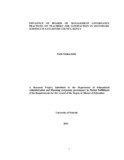| dc.description.abstract | The purpose of this study was to investigate the influence of the Boards of Management’s Governance Practices on teachers and job satisfaction in secondary schools in Tana River County. The study sought to determine the extent to which the Boards of management provision of autonomy to the teachers, involvement in decision making, recognitions and provision of conducive working environment influence secondary schools teachers job satisfaction. The target population consisted of all 308 Board members in the 22 public secondary schools and all 286 TSC teachers working in Tana River County. Stratified sampling was used to sample 143 teachers since it ensured equal chances for all schools. The study sampled 154 BoM members among them school’s Board chairpersons and secretaries. The study used descriptive survey design whereby teachers responded to a questionnaire while the Board of management responded to an interview. The two research instruments were picked due to their convenience and low cost. The questionnaire return rate was 84.17 percent. Data was analyzed by use of descriptive statistics and presented by means of pie charts, bar graphs and frequency tables. The study found that 80 percent teachers were satisfied with the autonomy provided by the Board during classroom teaching. On whether the Boards consulted the teachers before making decisions, 38.3 percent teachers were disgruntled with teachers’ involvement in setting school and subject targets while 65 percent of the respondents were also displeased with school infrastructure. On provision of conducive working conditions by the board, majority of teachers, 55 percent were disappointed with the conditions of the offices and staffrooms. On housing, only 12.5 percent teachers were housed in the area schools. Most of the teachers were thus forced to commute for long distances outside the schools. Concerning recognition of teachers by the Board, majority 66.7 percent teachers were unhappy with monetary tokens by the Boards for work well done. Most of the teachers 84.1 percent were discontented with training opportunities provided by the BoM. Majority of the teachers, 51.6 percent indicated their disappointment with out of school treats. The study concluded that the Boards of Governance practices played a major role in teachers’ job satisfaction and should build more staff houses in order to house most of the teachers within the school to alleviate the problem of teachers’ commuting from far areas outside the schools. The study recommends that the Board of management should assess the safety and sanitation situation and address not only infrastructure but also policies and guidelines to ensure the safety and hygiene of both teachers and students in Tana River County. | en_US |

